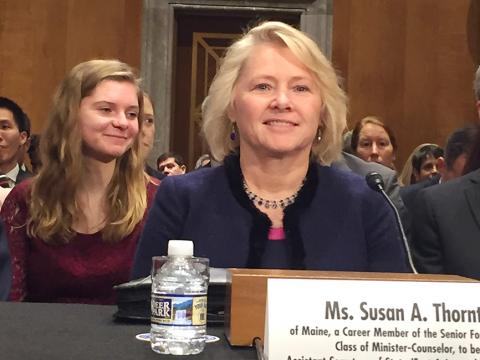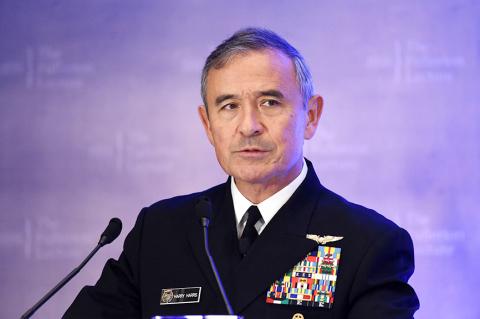The Ministry of Foreign Affairs yesterday reiterated that Taiwan’s status as an independent, sovereign state is a fact and the “status quo,” after a high-level US Department of State official said the removal of the Republic of China (ROC) flag from several US government Web sites was in line with Washington’s policy.
Ministry spokesman Andrew Lee (李憲章) said the government would continue to maintain this “status quo” and defend the nation’s democratic values and way of life.
However, Lee said Taiwan-US ties have progressed significantly over the past years thanks to the US’ Taiwan Relations Act, expressing confidence that bilateral relations would only grow stronger.

Photo: Nadia Tsao, Taipei Times
Lee made the remarks one day after US Senator Marco Rubio asked Susan Thornton, acting assistant secretary at the US Department of State’s Bureau of East Asian and Pacific Affairs, if she was aware of the disappearance of the ROC flag from the Bureau of Consular Affairs’ Web site last month.
Thorton told a meeting of the US Senate Committee on Foreign Relations that she was aware of the flag incident, but said the Bureau of Consular Affairs’ Web site was done through a contract and was not seen by her office.
“Following the publication, we don’t recognize, of course, Taiwan as an independent country and we don’t recognize the flag of the ROC as a country where we have official relations. Our policy is to not display the flag of the ROC on US official government Web sites,” Thornton said.

Photo: AFP
When Rubio asked whether it was a new policy, as the flag had been displayed before, Thornton said that not displaying the ROC flag was not a new policy.
Aside from the consular bureau, the State Department and the Office of the US Trade Representative also removed the ROC flag in September last year and last month respectively.
In other developments, Admiral Harry Harris, commander of the US Pacific Command (USPACOM), said at a meeting of the House of Representatives’ Committee on Armed Services on Wednesday that the US would continue to help Taiwan defend itself and that any attempt by China to force Taiwan into unification must be deemed unacceptable.
Taiwan’s open economy and prosperous, free and democratic society “reflect the shared values between Taiwan and the US,” Harris said.
While the US does not have diplomatic relations with Taiwan, “we maintain a substantive and robust relationship with the people of Taiwan based on the Taiwan Relations Act of 1979,” he added.
“In line with this policy, USPACOM will continue supporting Taiwan’s efforts to develop a credible, resilient and cost-effective deterrent and self-defense capability,” he said in a statement on the US military posture and security challenges in the Indo-Asia-Pacific region.
He said arms sales and training for the Taiwanese military are an important part of that policy and help ensure the preservation of Taiwan’s democratic institutions.
As China’s military spending and capability continue to grow every year, the ability of Taiwan to defend itself decreases, Harris said.
Against such a backdrop, “we must continue to help Taiwan defend itself and demonstrate US resolve that any attempt by China to force reunification on the people of Taiwan is unacceptable,” he said.
USPACOM has supported extensive security cooperation activities with Taiwan in the areas of air and missile defense, maritime security, logistics support and joint operations and training, he said.

CHAOS: Iranians took to the streets playing celebratory music after reports of Khamenei’s death on Saturday, while mourners also gathered in Tehran yesterday Iranian Supreme Leader Ayatollah Ali Khamenei was killed in a major attack on Iran launched by Israel and the US, throwing the future of the Islamic republic into doubt and raising the risk of regional instability. Iranian state television and the state-run IRNA news agency announced the 86-year-old’s death early yesterday. US President Donald Trump said it gave Iranians their “greatest chance” to “take back” their country. The announcements came after a joint US and Israeli aerial bombardment that targeted Iranian military and governmental sites. Trump said the “heavy and pinpoint bombing” would continue through the week or as long

TRUST: The KMT said it respected the US’ timing and considerations, and hoped it would continue to honor its commitments to helping Taiwan bolster its defenses and deterrence US President Donald Trump is delaying a multibillion-dollar arms sale to Taiwan to ensure his visit to Beijing is successful, a New York Times report said. The weapons sales package has stalled in the US Department of State, the report said, citing US officials it did not identify. The White House has told agencies not to push forward ahead of Trump’s meeting with Chinese President Xi Jinping (習近平), it said. The two last month held a phone call to discuss trade and geopolitical flashpoints ahead of the summit. Xi raised the Taiwan issue and urged the US to handle arms sales to

State-run CPC Corp, Taiwan (CPC, 台灣中油) yesterday said that it had confirmed on Saturday night with its liquefied natural gas (LNG) and crude oil suppliers that shipments are proceeding as scheduled and that domestic supplies remain unaffected. The CPC yesterday announced the gasoline and diesel prices will rise by NT$0.2 and NT$0.4 per liter, respectively, starting Monday, citing Middle East tensions and blizzards in the eastern United States. CPC also iterated it has been reducing the proportion of crude oil imports from the Middle East and diversifying its supply sources in the past few years in response to geopolitical risks, expanding

Pro-democracy media tycoon Jimmy Lai’s (黎智英) fraud conviction and prison sentence were yesterday overturned by a Hong Kong court, in a surprise legal decision that comes soon after Lai was jailed for 20 years on a separate national security charge. Judges Jeremy Poon (潘兆初), Anthea Pang (彭寶琴) and Derek Pang (彭偉昌) said in the judgement that they allowed the appeal from Lai, and another defendant in the case, to proceed, as a lower court judge had “erred.” “The Court of Appeal gave them leave to appeal against their conviction, allowed their appeals, quashed the convictions and set aside the sentences,” the judges